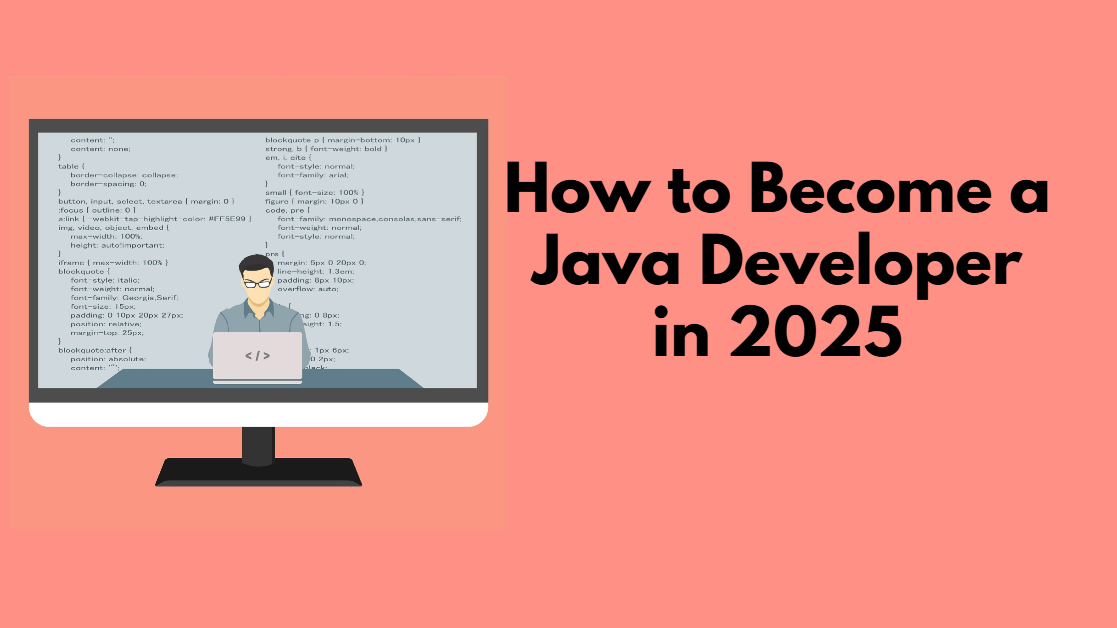Introduction
Java development remains a promising career choice in 2025. Businesses rely on Java for web applications, mobile apps, and enterprise solutions. Learning Java opens doors to opportunities in software development. Here’s a structured guide to becoming a Java developer this year.

Basic Concepts
Mastering the basics is the first step toward becoming a Java developer. Understanding these concepts helps in building a strong programming foundation.
1. Learn Core Java
Understanding the fundamentals is crucial. Start with:
- Variables, Data Types, Operators
- Control Statements, Loops
- Object-Oriented Programming (OOP)
- Exception Handling
- Collections Framework
- Multithreading
Practice by writing small programs to reinforce concepts. YouTube tutorials provide excellent step-by-step guidance.
2. Understand Databases
Java applications interact with databases frequently. Learn:
- SQL queries and database design
- MySQL, PostgreSQL, and MongoDB
- JPA (Java Persistence API) for database management
Hands-on experience in database connectivity and management is valuable.
3. Explore Frontend Technologies
Full-stack Java developers need frontend skills. Learn:
- HTML, CSS, JavaScript
- React.js, Angular, or Vue.js
- AJAX and JSON for API interaction
Knowledge of frontend development complements backend skills and improves job prospects.
Advanced Concepts
Once the basics are clear, it’s time to explore advanced Java topics. These concepts will help in developing high-performance applications.
1. Master Advanced Java
Once comfortable with the basics, move to advanced topics:
- Java Database Connectivity (JDBC)
- Servlets and JSP
- JavaFX for UI Development
- Java 17+ Features
Projects using these technologies help in gaining practical know2. ledge.
2. Work with Java Frameworks
Modern applications use frameworks for faster development. Key frameworks include:
- Spring Boot for building microservices
- Hibernate for ORM (Object-Relational Mapping)
- Struts for MVC applications
Learning these frameworks improves employability and development efficiency.
3. Work with DevOps Tools
Modern Java development integrates DevOps. Learn:
- Git and GitHub for version control
- Docker for containerization
- Jenkins for CI/CD pipelines
- Kubernetes for deployment
Employers prefer developers who understand the software development lifecycle and deployment strategies.
4. Gain Experience with Cloud Platforms
Cloud computing is essential in 2025. Get familiar with:
- AWS (Amazon Web Services)
- Google Cloud Platform (GCP)
- Microsoft Azure
Building and deploying Java applications on cloud platforms enhances skills.
5. Build Real-World Projects
Applying skills in real projects solidifies knowledge. Work on:
- Web-based applications
- RESTful APIs
- E-commerce systems
Contribute to open-source projects or develop a portfolio on GitHub.
6. Prepare for Java Certifications
Certifications improve credibility. Consider:
- Oracle Certified Java Programmer (OCP)
- AWS Certified Developer – Associate
- Spring Professional Certification
These certifications validate expertise and increase job opportunities.
7. Stay Updated and Keep Practicing
Java evolves with new versions and features. Follow:
- Java official documentation
- Developer communities on YouTube
- Tech blogs and forums for the latest trends
Consistent learning and practice ensure success as a Java developer in 2025.
Conclusion
Becoming a Java developer in 2025 requires dedication and continuous learning. Mastering core and advanced Java, working with frameworks, and gaining experience in databases, frontend technologies, DevOps, and cloud computing are essential steps. Building real-world projects and obtaining certifications enhance credibility. Staying updated with industry trends ensures long-term career growth.
FAQ
1. How long does it take to become a Java developer? The time varies depending on prior experience. Beginners may take 6-12 months, while those with programming knowledge can become proficient in 3-6 months.
2. Do I need a degree to become a Java developer? A degree helps but is not mandatory. Many developers succeed by learning from YouTube tutorials and self-study.
3. Which Java framework should I learn first? Spring Boot is the most popular choice for building enterprise-level applications.
4. Is Java still relevant in 2025? Yes, Java remains widely used in web applications, enterprise solutions, and mobile development.
5. How can I get my first Java job? Build projects, learn from YouTube tutorials, create a strong GitHub portfolio, and apply for internships or entry-level positions.
Mastering these steps will help in building a successful career as a Java developer in 2025.
That’s a wrap!
Thank you for taking the time to read this article. I hope you found it informative and enjoyable. If you did, please consider sharing it with your friends and followers. Your support helps me continue creating content like this!
Thanks!
Kamal Pankaj😊



